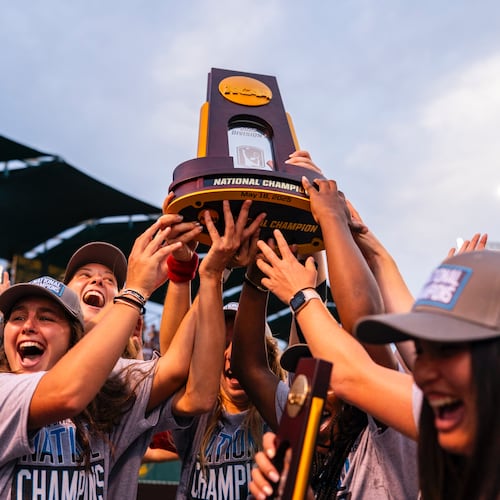What would you say to college football next spring? Not spring practice, mind you, but full-fledged, counts-in-the-standings football with wins and losses against actual opponents and a playoff in June?
It’s one of the possibilities “decision-makers” are considering, according to ESPN’s Kirk Herbstreit.
Herbstreit shared that scenario in a teleconference call with reporters Monday to discuss this week’s NFL draft. He said playing the football season next spring is one of the contingencies that is being discussed by college leadership about what might happen on the other side of the ongoing coronavirus pandemic.
College and professional sports have been halted through May and there remains only conjecture about when they might resume.
Citing “a ton of people who are actual decision-makers in the college game,” Herbstreit” said the football season could start in February and be played through May, with the College Football Playoff being conducted in June.
“I think (it would be) a last-ditch effort,” Herbstreit said. “But I think it just proves how willing the administrators are -- the NCAA, the conference commissioners, ADs and presidents -- to have a college football season. They’re going to do everything they can, if it comes to that extreme, to be able to potentially have a 2020 season.”
Herbstreit emphasized that the No. 1 option remains to play the season as scheduled. The first games are slated to be played the last weekend of August. Georgia Tech is scheduled to open Sept. 3 against Clemson, and Georgia is set to play Virginia on Labor Day, Sept. 7, in the Chick-fil-A Kickoff game at Mercedes-Benz Stadium.
UGA Athletic Director Greg McGarity said playing the football season in the spring is indeed among scenarios he has heard discussed in weekly conference calls with fellow college athletics administrators.
“Sure, we always have discussions about a lot of different possibilities,” McGarity said Monday. “But the good news is we don’t have to make those decisions now. We have time on side, and the windows are open for all alternatives. But all of them depend on the progress we’re making against the virus.”
There some obvious push-backs against a spring-football scenario. The main one would be asking players to play a minimum of 24 games in a calendar year. There are also the added complications of television-network scheduling, which would have basketball, baseball and possibly NFL games to consider.
There also have been discussions of playing a shortened season that starts later than currently scheduled, conference-only schedules and, of course, simply skipping the 2020 football season altogether. There are economic considerations within all those scenarios, as well.
Of course, getting the governments of 50 states – not to mention 125 universities fielding FBS teams – to agree on how and when to proceed is another hurdle that would have to be cleared. But there is much to be decided before an ultimatum is reached on sports.
“Just think about what we didn’t know a month ago and what we know now,” McGarity said. “Just think about how much more information we’ll have in May and how much progress we might make on stemming the virus by then. So, it’s fine to have these discussions, and they stimulate creativity. But we don’t have to make any decisions right now.”
Herbstreit actually floated the spring-football scenario after being asked by a New York Post reporter Monday if Herbstreit stood by his comments from several weeks ago in which he said he “would be shocked” if football was played this fall.
Herbstreit insisted those comments, made in an ESPN radio interview, were "misconstrued" and blown out of proportion.
“I was almost just thinking out loud,” Herbstreit said. “It was the day baseball was supposed to start, opening day, and we were reminiscing about how sad it is that we weren’t having any baseball. I was like, ‘Hey, man, this thing’s scary. We may not even have football.’ I was kind of thinking out loud at that point.”
Herbstreit wasn’t about to offer any conjecture this time around.
“I’m not making any predictions; I really wasn’t that night,” he said. “I was just trying to explain how real this pandemic is.”
About the Author
Keep Reading
The Latest
Featured


